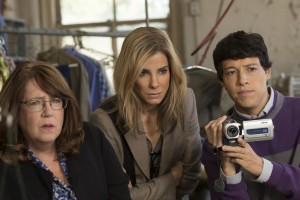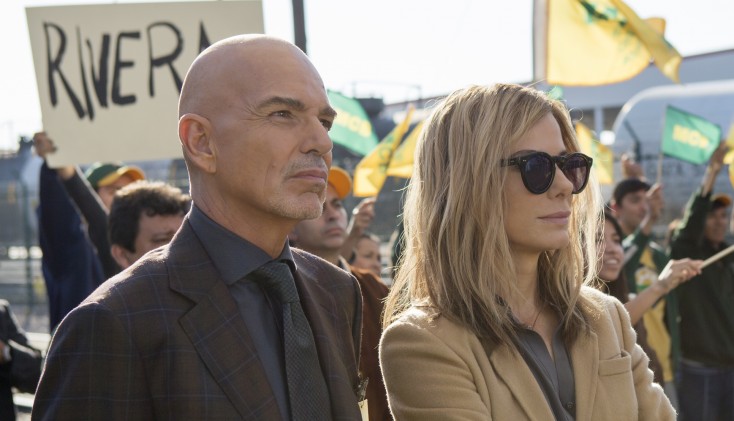
(l-r) Ann Dowd as Nell, Sandra Bullock as Jane Bodine and Reynaldo Pacheco as Eddie in OUR BRAND IS CRISIS. ©Warner Bros. Enertainment/Ratpac-Dune Entertainment. CR: Patti Perret.
By ANGELA DAWSON
Front Row Features
HOLLYWOOD—There is an action-packed scene in the upcoming political satire “Our Brand in Crisis” where star Sandra Bullock is aboard a bus as it barrels dangerously along a highway. No, this is not another “Speed ” sequel and no, Keanu Reeves is nowhere in sight.
The Oscar winner (“The Blind Side”) stars opposite Oscar winner Billy Bob Thornton (“Sling Blade”) in this political satire, which pokes fun at and sheds some damning light on how modern political campaigns are run. Bullock plays Jane Bodine, nicknamed Calamity Jane, a smart but very emotionally damaged former campaign strategist who is lured out of retirement to help raise the poll numbers for a Bolivian ex-president trying to reclaim his office. She runs up against her old nemesis, the brilliant but underhanded Pat Candy, played with quite menace by Thornton. As Candy zeroes in on Jane’s vulnerabilities, he drives her into a personal crisis as intense as the one her team exploits nationally to boost their candidate’s numbers.
Asked during a recent publicity stop whether it was fun being back on a speeding bus, she responds, “Oh God, not at all!”
The film, directed by David Gordon Green (“Pineapple Express”) from a screenplay written by Peter Straughan (“Tinker Tailor Soldier Spy” 2011 remake) reunites her with her “Gravity” co-star George Clooney, who serves as a producer, but does not appear in the film. In addition to starring in the film, Bullock is one of its executive producers.
At a press conference, the Washington, D.C., native spoke about playing a smart and vulnerable character, as well as about gender politics in Hollywood and her political leanings.
Q: How was it working with George Clooney again? Was it better this time?
Bullock: Nope! Same ****. (She laughs.) It’s nice to be able to work together. You grow up and you think you’ll share life experiences. You’ll mellow out. You share your new sense of self. You’ve learned something, hopefully. It’s nice that we work in a place where you’re allowed to keep coming back and having new experiences. I don’t think any of us take that for granted, but to be able to sit with Grant (Heslov, a producer) and George and argue about what we’re passionate about is great. We might all come from different places but we all ended up with the same end result, which was best for the movie. We’re good at arguing our points of view and never feeling like it got personal, so that’s what I really appreciate about the opportunity to do it.
Q: What was your relationship like on set with co-star Billy Bob Thornton?
Bullock: What we did was allow certain awkward and uncomfortable moments from the demise of our characters’ relationship to seep into various moments that were pivotal to the script. We said, “Is this appropriate to allow in what happened when you did that really horrible thing to me into this moment?” And, “Remember when I got revenge I and was like **** you? Is that appropriate to bring in now?” We found a great balance with that, which I think kept the script alive. Sexual tension is unstoppable. You can’t manufacture it. It either is there or isn’t. I think what you see is the end results of our power.
Q: Do you remember a moment on set where Billy Bob threw you off?
Bullock: Yeah, he opened his mouth. (She laughs.) There’s about two and a half hours of footage where David (Green, the director) just had us behind the screen saying the most bizarre things and then just let us go. It just became more and more creepy.
Q: What are your political leanings?
Bullock: I was born in (Washington) D.C. and raised in Arlington, Virginia, in a household where one parent was Republican and one was a Democrat, so I got both sides. The thing that I remember the most is not understanding why, if you were doing the right thing, people wanted to kill you? That was the question I remember asking my parents that they couldn’t answer. Why is it that when people are trying to help other people, why is it that they get killed? I remember I didn’t get an answer for that and I know that they couldn’t answer that because I was too young to understand the bigger picture of it.
Q; Are you political today?
Bullock: I’m not politically vocal. I just want what’s best for my country. I would like my rights represented and those of my son. Those are very selfish views that everyone has. This film came along at a time when I was having that sort internal discussion with myself about who in our country would step out of his or her comfort zone to help others, for the greater good.
I’ve watched the Freedom Riders documentary many times. There’s one story in it that really affected me about this young woman who is the first in her family to go to college. She went and told her parents, “I’m going to leave college in order to ride and represent the future.” I was so moved by that. It made me wonder, “Who would do that now? Who would do that for my son?” I would, but I would do anything for my son. I want people to get together and peacefully protest for the greater good. And then this (script) came along.
Q: What did you think when you first saw the script?
Bullock: I went, “Wow, it’s really interesting that this is what I’ve been thinking about.” The universe gives you something that might be set in Bolivia, but it could be set anywhere. It’s about who is willing to get off the carousel of success, winning, making money, and how they look to let that go and put their neck out for the greater good.
Have we all gotten too scared and too safe? I don’t know. That all stands from how I grew up. My parents broke the mold. They did things that were not fashionable. My mother was definitely ahead of her time as a woman. I never realized that there were limitations (on women), and that I was looked at as less than until I was actually pretty deep in this business. I had pretty unsettling moment at one point and said, “Oh my God, I’m being treated this way because I’m female.” So a lot of things started bubbling up, to blossom in me. I don’t know if it’s politically Republican or Democrat, but I grew up to be exactly who I was suppose to be and have the opinions I wanted to have, and didn’t realize there were limitations to that. I thought, politically, I was pretty open-minded and could speak my mind, and then I realized I wasn’t supposed to.
Q: Your character originally was written for a man, but it was rewritten when you came on board. What was the tipping point of your career that made you start to look at roles that were written for men that were then rewritten for a woman?
Bullock: My quest started before this film when I was looking at comedies. I was like, “Why is the only comedy available for women—romantic comedies?” I was so done. I yearned for comedies, so I started saying to my agent, “Can I look at every script Jim Carrey doesn’t want to do to see if (the character’s gender) can be switched?” It started a while ago and nothing really popped up that I felt was extraordinary. Then “The Heat” (2013’s hit buddy comedy with Melissa McCarthy) showed up, which I felt was a great comedy that wasn’t centered on a woman getting a man.
Q: What have you learned looking at these roles?
Bullock: I’ve learned absolutely nothing! (She laughs.) I’ve learned that you can’t worry about getting a no. I think, as actors, we’re used to getting no’s in this business, but you have to keep going forward or you’ll never work again. So I learned that sometimes you just have to ask. It can’t hurt to ask. I’m glad I asked and they could have said no, but they didn’t.
Q: What do you think your character would tell Donald Trump or Hilary Clinton?
Bullock: It depends on whom my character was working for and who was paying her. It depends on where the money is flowing from. My character only goes where the money goes. At the beginning of the film, whoever was paying her, she’d have whatever advice. (Trump and Clinton) actually are doing really well on their own. I think they’ve got pretty good people working behind them. I don’t think (my character) would need to step in.
Q: What do you think about Donald Trump and what he said about Hispanic immigrants?
Bullock: I don’t agree with that at all. I thought that was not a statement I could get behind. I don’t agree with that statement.
Q: Who do you think needs more of your character in this election?
Bullock: I think the beautiful thing about this day and age is I’d rather no one have a patent on Jane. Because of the way the world is today, you can’t live a hidden life. As someone running for office, everything is going to be found out. I’d rather everyone mess up and present exactly who they are and it not be so well-oiled, run and manipulated, so that we (voters) can make a decisions about who we really want base on who the people truly are.
It’s gotten really difficult to hide. Even the masterminds and the puppeteers can’t hide this stuff anymore. As we’ve seen, on either side, it’s all going to come out. The dirt keeps resurfacing. The mud keeps getting flung. I want to see the candidates be as genuine and authentic as possible, no matter how unraveled that might be. I don’t want them to have a Jane and Pat covering things up. I want to see the mess unfold so I can make at least some kind of honest decision about who I want to be in charge of everything.
Q: You were the first Caucasian woman to produce a TV network sitcom about a Hispanic family in America with “The George Lopez Show.” What is your personal opinion about the Hispanic community in United States?
Bullock: I never separate the Hispanic community from America. My friends and my family are from Hispanic communities. I’ve never looked at that as a separate thing to address. If someone’s a good person, come into my fold. If you’re not good person, stay out of my house.





